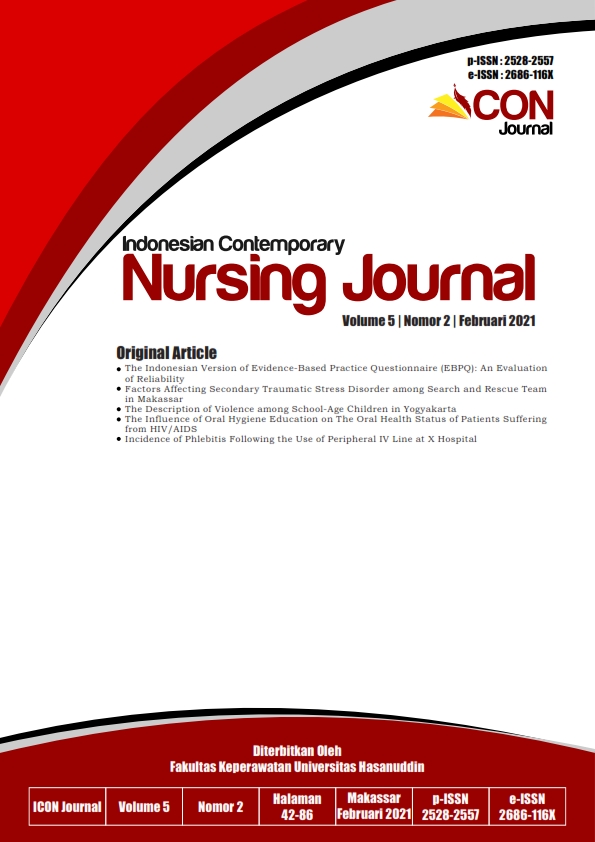Relationship of Knowledge and Perceptions Towards Triage Skills on Nurses in The Emergency Department
DOI:
https://doi.org/10.20956/icon.v7i1.19680Keywords:
Knowledge, Perception, Skill, TriageAbstract
Introduction: The large number of patients visiting the emergency department requires triage system. The implementation of triage really requires the skills possessed by nurses who have good knowledge and positive perceptions about triage. The purpose of this study was to determine the relationship between knowledge and perceptions of nurses with triage skills on nurses in the Emergency Department of RSUP Dr. M. Djamil, Padang. Method: This study is a quantitative study with an analytical descriptive type using cross-sectional approach. The sampling technique used convenience sampling technique with the criteria of emergency department nurses who work in the triage area with respondent participated as 34 nurses. Data collection using instruments, as knowledge questionnaire, perception questionnaire, and TSQ (Triage Skills Questionnaire). Result: There is a relationship between knowledge and triage skills in nurses with p value 0,015 and no relationship between nurses’ perceptions and triage skills with p value 0,063. Conclusion: Good knowledge for nurses can help nurses in carrying out triage actions properly so that they motivate nurses to categorize patients correctly based on the level of emergency. Training, seminar or long-life learning on triage will be able to assist nurses in improving nurses triage skills in the emergency department.
References
Afaya, A., Azongo, T.B., & Yakong, V. N. (2017). Perceptions and knowledge on triage nurses working in emergency department of hospitals in the Tamale Metropolis, Ghana. Journal of Nursing and Health Science, 6(3), 59-65. https://doi.org/10.9790/1959-0603065965
Ali, S., Taverner, B, C, B., Ghani, M., Kussor, Z., & Naz, S. (2013). Knowledge of triage among nurses in Emergency Units. Biomedica, 29, 240-243
Aloyce, R., Leshabari, S., & Brysiewicz, P. (2014). Assessment of knowledge and skill of triage amongst nurses working in the emergency centres in Dar es Salaam, Tanzania. African Journal of Emergency Medicine, 4 (1), 14-18. https://doi.org/10.1016/j.afjem.2013.04.009
Bashkin, O., Caspi, S., Haligoa, R., Mizrahi, S.,& Stalnikowicz, R. (2015). Organizational factors affecting length of stay in the emergency department: initial observational study. Israel Journal of Health Policy Research, 4, 3.https://doi.org/10.1186/s13584-015-0035-6
Duko, B., Geja, E., Oltaye, Z., Belayneh, F., Kedir, A., & Gerbire, M. (2019). Triage knowledge and skills among nurses in emergency unit of specialized hospital in Hawasa, Ethiopia: cross sectional study. BioMed Central Research Notes, 12(1). https://doi.org/10.1186/s13104-019 4062-1
Fadli., Sastria, A., & Usman, E. (2017). Pengetahuan dan pengalaman perawat dalam penilaian triage di Instalasi Gawat Darurat. Jurnal Ilmiah Kesehatan Pencerah, 6(1), 54-58
Fathoni, M., Sangchan, H., & Songwathana, P. (2010). Triage knowledge and skills among emergency nurses in East Java Province, Indonesia. Australasian Emergency Nursing Journal, 13(4), 154. https://doi.org/10.1016/j.aenj.2010.08.304
Fathoni, M., Sangchan, H., & Songwathana, P. (2013). Relationship between triage knowledge, training, working experiences, and triage skills among emergency nursing East Java, Indonesia. Nurse Media Journal of Nursing, 3(1), 511-525. https://doi.org/10.14710/nmjn.v3i1.4466
Kerie, S., Tilahun, A., & Mandes, A. (2018). Triage skill and associated factors among emergency nurses in Addis Ababa, Ethiopia 2017: a cross-sectional study. BioMed Central Reaseach Notes, 11, 658. https://doi.org/10.1186/s13104-018-3796-8
Khairina, I., Malini, H., & Huriani, E. (2020). Pengetahuan dan keterampilan perawat dalam pengambilan keputusan klinis triase. Jurnal LINK, 16(1), 1-5. https://doi.org/10.24269/ijhs.v2i1.707
Mohammed, A. E. (2017). Nurses' knowledge regarding Triage in Omdurman Teaching Hospital, Omdurman locality, Khartoum state, Sudan (2016) (Doctoral dissertation, University of Gezira).
Mugianti. (2016). Manajemen dan kepemimpinan dalam praktek keperawatan. Jakarta Selatan: Pusdik SDM Kesehatan
Natarianto, R., Agustina, D, M., & Nursery, S. M.C. (2018). Pengetahuan dan persepsi perawat tentang triage di unit gawat darurat rumah sakit umum daerah. Jurnal Keperawatan Suaka Insan (JKSI), 1-7
Oman, K., Koziol, J. (2012). Panduan belajar emergency. Jakarta: EGC. Peraturan Menteri Kesehatan Republik Indonesia. (2018). Peraturan menteri kesehatan RI No. 47 tentang pelayanan kegawatdaruratan. Jakarta: Menteri Kesehatan Republik Indonesia Pradana,
Setyawan, Rahmawati. (2016). Gambaran pengetahuan perawat dalam melakukan triase di UGD Kota Surakarta. Surakarta: Stikes Kusuma Husada
Santosa, W., Bakar, A., & Wahyuni, E.D. (2015). Hubungan pengetahuan perawat tentang pemberian label triase dengan tindakan perawat berdasarkan label triase di IGD Rumah Sakit Petrokimia Gresik. Fakultas Keperawatan Universitas Airlangga, 33-37
Seda, Ahmed W. (2020). Nurse’s knowledge, perception regarding the implementation of triage system in pediatric emergency department at Gaza Strip [thesis]. Jerussalem-Palestina: Al-Quds University
Sulistiawan, B.A. (2016). Hubungan persepsi perawat dengan motivasi dalam pendidikan praktik klinik pada mahasiswa keperawatan semester vi Universitas Diponegoro. Semarang: Universitas Diponegoro
Downloads
Published
How to Cite
Issue
Section
License
Authors who publish with this journal agree to the following terms:Authors retain copyright and grant the journal right of first publication with the work simultaneously licensed under a Creative Commons Attribution License that allows others to share the work with an acknowledgement of the work's authorship and initial publication in this journal.
Authors are able to enter into separate, additional contractual arrangements for the non-exclusive distribution of the journal's published version of the work (e.g., post it to an institutional repository or publish it in a book), with an acknowledgement of its initial publication in this journal.
Authors are permitted and encouraged to post their work online (e.g., in institutional repositories or on their website) prior to and during the submission process, as it can lead to productive exchanges, as well as earlier and greater citation of published work (See The Effect of Open Access).
Accepted 2022-08-19
Published 2022-08-30



